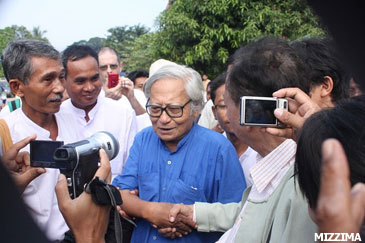New Delhi (Mizzima) – New Burmese media laws are being studied by journalist in classes in Rangoon to avoid breaching laws while covering the news.
The teacher, Khin Zaw, is a columnist for the ‘Crime Journal’ and chairman of the Mayangon Township branch of the Writers and Journalists Association.
 The classes are being conducted on weekends from May 1 to May 29, attended by reporters, lawyers and some interested businessmen, totaling more than 100 people. Classes are held at Building No. 1, No. 4 Ward, Mayangon Township, near the 8-mile junction.
The classes are being conducted on weekends from May 1 to May 29, attended by reporters, lawyers and some interested businessmen, totaling more than 100 people. Classes are held at Building No. 1, No. 4 Ward, Mayangon Township, near the 8-mile junction.
News coverage can violate laws if a person’s reputation is damaged by facts that are false, if published information hinders a fair trial, or if photographs a child are used inappropriately, to name just a few examples, said Kin Zaw, whose class also covers the Official Secrets Act. Journalist can find themselves in legal trouble if they visit restricted areas or write about matters that fall under privacy laws, he said.
Aspects of the Penal Code, Criminal Procedure Code, Civil Law, Evidence Act and the Contract Act are also subjects which he teaches.
Penalties in Burma vary, he said. If a journalist is guilty of Contempt of Court, the offence is punishable up to 6 months a fine, or both. If prosecuted under the Official Secrets Act, the offence could be punishable up to 14 year imprisonment, Khin Zaw said.
Previously, reporters had very few restrictions in covering the news, said veteran journalist Win Tin.
‘In our time, we had to take care of some restrictions, for instance, defamation and libel, and not to disturb the national unity, etc. That’s all. The restrictions were very general. Generally, the reporters didn’t notice the restrictions’, he said.
‘In parliament sessions too, we had a room reserved for media persons exclusively. We could witness the proceedings of parliament sessions and could cover that news. Moreover, we could meet MPs outside the parliament chamber, say in a cafeteria, we could ask them questions such as, why did you move this motion, why did you raise this question, etc’.
Even under the rule of dictator Ne Win, the media had a reserved newsroom in the 1074 parliament building, he said.
Currently, in the new Parliament sessions, which are now over, reporters were barred from the Parliament building, and had an almost impossible task of covering what was occurring inside the chambers. Even some of the motions made in Parliament were rejected on the grounds that they had been given to the media prior to being introduced in Parliament.
Reporters Sans Frontier (RSF) has listed Burma as among the world’s worst countries for freedom of the press.
In most countries, reporters can ask lawmakers questions, cover lawmaking sessions and freely report news and information, according to U Myo of the Burma Lawyers’ Council (BLC) Law Analyzing Department.
‘They can claim their right to report Parliament news. They can take news photos and videos of parliamentary sessions as the law permits. In many countries, the governments use these media to release and disseminating its news’, he said.
In his inaugural address to Parliament, President Thein Sein said that media reporting must be respected because it was the fourth pillar of democracy and that lawmakers should listen to the opinions of the people. However, many media critics say Burma has no free press, and no way to know what people are thinking about governmental issues and other matters.
‘The current problem for the media is the sweeping ban on our reporting, imposing so many restrictions on our journalists, and exercising censorship on what we can report’, journalist Win Tin said.
If the new government doesn’t allow more press freedom and listen to public opinion as expressed through the media, there will be no improvement in Burmese society, he said.



